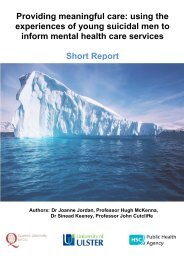Saving Mothers' Lives: - Public Health Agency for Northern Ireland
Saving Mothers' Lives: - Public Health Agency for Northern Ireland
Saving Mothers' Lives: - Public Health Agency for Northern Ireland
Create successful ePaper yourself
Turn your PDF publications into a flip-book with our unique Google optimized e-Paper software.
Most staff reported learning clinical lessons which, in many cases, led to a change in personal or Trust<br />
based practice. Other staff were more refl ective and philosophical:<br />
Even though she was a mother she was still a child herself.” (In relation to a young schoolgirl).<br />
“How inspiring the human spirit can be in the face of insuperable odds.”<br />
(For a woman dying of cancer).<br />
On the other hand a few professionals seemed oblivious to the poor quality of care they had provided, or to<br />
have had any understanding of the wider circumstances that may have affected a mother’s life and death.<br />
The assessors were also concerned by the apparently culturally dismissive or insensitive remarks made by<br />
a few professionals during the course of the reviews.<br />
In some cases staff appeared to take the blame upon themselves despite providing the best possible care.<br />
In these cases the Enquiry assessors were saddened as they considered the care these professionals<br />
had provided was exemplary and that the failings in the system were totally outside the control of these<br />
workers. Some staff who cared <strong>for</strong> women who declined help, or who had to watch a woman bleed to<br />
death while refusing blood products, reported signifi cant personal distress. It is important that all staff<br />
affected by a maternal death should be offered support and counselling to help them come to terms with<br />
their own reactions.<br />
Discussion and conclusions<br />
Although it is disappointing that the UK maternal mortality rate identifi ed by this Enquiry has failed to<br />
decline there are a number of changing demographic and public health factors which may explain this lack<br />
of progress. The Annex to this Chapter demonstrates the rapidly changing nature of motherhood in the UK,<br />
with more than 20% of women having babies in the UK themselves having being been born elsewhere.<br />
In addition, women who have just recently arrived in the UK from every part of the world present new, but<br />
often differing, challenges <strong>for</strong> maternity services.<br />
Maternal deaths are extremely rare, and the proportion of the very small number of mothers whose care<br />
was less than optimal has not increased <strong>for</strong> many years. In fact there were many instances of exemplary<br />
care provided <strong>for</strong> extremely sick women. However there is always room <strong>for</strong> improvement and high quality<br />
clinical care cannot, and should not, be taken <strong>for</strong> granted. When reviewing the cases <strong>for</strong> this triennium,<br />
the apparent lack of basic clinical knowledge and skills amongst some doctors, midwives and other health<br />
professionals, senior or junior, was one of the leading causes of potentially avoidable mortality. The<br />
Enquiry assessors were also struck by the number of health care professionals who failed to identify and<br />
manage common medical conditions or potential emergencies outside their immediate area of expertise.<br />
Resuscitation skills were also considered poor in an unacceptably high number of cases. As a result,<br />
several of the top ten recommendations of this Report address these critical areas.<br />
This Chapter and its Annex has shown that women are starting motherhood later in life which may have<br />
consequences <strong>for</strong> their pregnancy. Mothers also tend to be less healthy than in the past and embark on<br />
pregnancy in poorer overall general health. Over half of the women who died were overweight or obese,<br />
and the fact that cardiac disease is now the leading cause of maternal death demonstrates the growing<br />
impact of less than healthy lifestyle choices. What has been noticeable over the past few Reports is the<br />
steady increase in deaths in young mothers in what should be the prime of their lives from diseases such<br />
as lung cancer and myocardial infarction, conditions never seen in earlier triennia.<br />
43



